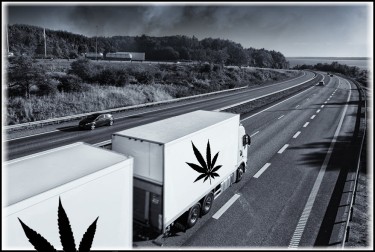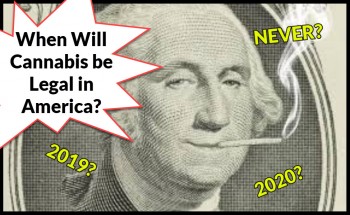
The Road to Nowhere: Why Cannabis Reparations Are a Well-Intentioned Mirage
Lately, politicians pushing cannabis legalization frequently cite a "moral responsibility" to rectify past war on drugs damages through social equity programs. On its face, righting historical wrongs sounds noble. But scrutinized closely, the promise of cannabis reparations leads nowhere.
Majority Leader Chuck Schumer recently affirmed intentions to amend pending federal banking reform to ensure "criminal justice provisions like those included in CAOA are part of the SAFE Banking Act." He envisions resentencing, expungements and more restorative measures.
No doubt these aims arise from genuine compassion. Yet they fundamentally misapprehend the nature of justice. True reparations require relinquishing all controls that created harms in the first place. Bandaging prohibition's wounds simply prolongs underlying dysfunction.
Consider alcohol prohibition from 1920-1933. As it proved unenforceable, temperance campaigners insisted any repeal must address the fallout of speakeasies and mob violence prohibition directly fueled.
But the only pragmatic solution was fully restoring legality. No amount of restorative policy could undo harms still actively inflicted by banning alcohol itself.
Cannabis today parallels this myopia. Legalization advocates dangle "social equity" policies to soften prohibition, not sincerely end it. But half-measures merely redirects the damage of black markets into mass incarceration's revolving doors.
Either consensual adult activities remain banned, feeding organized crime and police corruption. Or they are fully legalized, replacing dangers with regulation. Reparations tinker in purgatory between these realities.
If government assumes responsibility for drug war damages, as advocates urge, its only logical remedy is abolishing controls enabling them. Not conditional pardons still branded with criminality.
Until cannabis is descheduled like alcohol, politicians exploit dreams of restorative justice to perpetuate cultural prejudices against cognitive liberty and nature's bounty. But thinly-veiled puritanism helps no one.
True leadership would simply end prohibition outright, not devise new ways to condemn peaceful choices while begrudgingly taxing them. But such courage remains rare in halls of power divorced from real people's lives.
So lawmakers cling to magical thinking - that they can prohibit, punish and extract revenue simultaneously. But years of compounding contradiction expose this charade.
Either drugs are banned outright on moral grounds, or pragmatically regulated as agriculture. Reparations are rhetorical cover to avoid confronting this choice. Because ending prohibition fully means ceding social control, trusting people over fear. And that remains taboo.
The road to justice follows no middle ground. Policies arise from principle or from theater. And people suffer while politicians posture.
The Mirage of Social Equity
Politicians pushing cannabis reform tout "social equity" provisions as the answer to past harms. By empowering marginalized communities in the newly legal industry, the wounds of prohibition will supposedly heal. But this well-intentioned reasoning misses the mark.
In reality, nothing can retroactively undo generations traumatized by a senseless drug war. That damage is done, and no current policy alters the past. Preferencing some citizens now cannot miraculously erase systemic oppression already inflicted.
Yet advocates cling to social equity as legalization's moral imperative, imagining present actions can somehow compensate for history's suffering. But just as banning alcohol created Al Capone, prohibiting drugs fueled the damage reformers now seek to redress.
Did temperance activists make amends for bootleg violence by granting extra liquor licenses to poor communities after repeal? That would have insulted those communities as somehow culpable, not helped them.
Likewise, creating cannabis business advantages for groups targeted under prohibition perversely rewards state violence that foreclosed any opportunity in the first place. It attempts to remedy a gunshot wound with a bandaid.
And fundamentally, establishing any legal distinction among citizens to correct past wrongs still perpetuates division and control, even benevolently intended, But cannabis users of all races suffered equally under blanket prohibition. The war on drugs made no exceptions based on identity, nor should its cessation.
In practice, such preferential policies breed resentment and allegations of favoritism, helping few while changing nothing systemically. The only pragmatic solution is fully ending the policies still actively causing harm to all. Reform should lift everyone equally, not play judicial favoritism.
Leaders serious about addressing the drug war aftermath would focus resources into ravaged communities for healthcare, education, jobs, infrastructure, and economic opportunities prohibited by generations of oppressive policies. Not create a regulatory caste system as some symbolic act.
But even these substantive measures only mitigate, not undo, the violence inflicted on generations through “carceral” threats pressuring conformity. Ultimate justice means simply ending prohibition so no more share that trauma.
No law can restore lost lives, families, careers and dreams destroyed by self-righteous persecution. But ending the war that wrought such damage would honor those sacrificed for nothing. That reform alone is the greatest justice we can offer fellow citizens still living in fear.
Social equity might sound righteous but promises the impossible - to rewrite history with policies when only shared humanity can heal trauma. The pragmatic path forward should be non-judgment and freedom.
Towards Meaningful Reparations
While past harms of prohibition can't be undone, we can take concrete steps to acknowledge injustice and ease reintegration for those still suffering under oppressive policies soon to be abolished. Financial reparations represent one pragmatic transitional measure.
For every year someone spent incarcerated for a non-violent drug offense, the government could provide the monetary equivalent of one year's median income plus benefits as if they had been working a union job instead. This retroactively compensates for lost opportunities.
So those jailed for a decade may receive around $500,000 or more upon release, proportional to their sentenced time served under unconstitutional policies of persecution. They can invest this new capital towards rebuilding life on their own terms after years sacrificed to ideology.
This money empowers starting businesses, pursuing education, purchasing homes, or simply enjoying simple pleasures long denied behind bars. A small token of recompense for freedoms robbed that can never be retrieved.
Some may argue they don't "deserve" such generous compensation for technically breaking the law at the time, despite its injustice. But obeying immoral rules merits no punishment - and rectifying past enforcement necessitates assuming full responsibility.
Financial reparations acknowledge the government's own culpability in destroying lives, rather than demonizing victims of its aggression. Compensating those still suffering is the only moral response, even if no dollar amount restores what was lost.
Moving forward, these individuals should also receive permanent waivers on any related taxes, fees, or restrictions related to consensual activities previously prosecuted. Never again should they face harassment from the state.
Additionally, their records must be completely expunged, liberating them from stigma and constraints on employment, housing, education, and civic participation. They deserve a clean slate after years enduring dehumanization.
However, no policy can undo the psychological trauma of incarceration and family disruption. We must acknowledge money alone cannot truly compensate for the nightmare of being caged for victimless choices. But it represents a starting point of taking tangible accountability.
The funds should come directly from the DEA's budget and asset forfeitures, not general taxpayer money. And programs reinvesting legal drug tax revenue into devastated minority communities should accompany individual reparations.
A cynic may condemn these measures as superficial, noting the time lost can never be reclaimed. And they would be right that it pales against the depth of suffering induced. But the practical mechanics of restorative policy must start somewhere. The debt owed is unpayable yet must be addressed.
In the end, only ending prohibition offers true justice by halting the ongoing harms. No laws can resurrect the dead or restore lives warped by fear. But pairing abolition with compensation provides a blueprint for accountability, good faith and reconciliation. It says we as a society have learned from past evils, grown wiser, and now must make amends however imperfectly. The first step is pronouncing unconditional freedom.
The Sticky Bottom Line
Social justice and equity make for enticing buzzwords. But uplifting those harmed by prohibition requires relinquishing control, not inventing new ways to tax and regulate freedoms.
The drug war's injustice cannot be abolished through bureaucracy. No law undoes the trauma of lives warped by fear. And no preferential license repairs the economic wreckage in marginalized communities targeted under puritanical policies.
Reparations provide rhetoric to mollify reformers high on empty idealism. But they avoid confronting the root injustice - prohibition itself. Half-measures only redirect damage through revolving prison doors and street violence feeding organized crime.
The charade has gone on long enough. If we as a society are remotely serious about making amends, it begins by ending the oppressive policies still actively harming fellow citizens. No exceptions.
Responsible legalization means abolishing adult restrictions on any substance alongside reasonable regulations on sales, manufacturing and labeling for public health.
It liberates consumers to make informed choices based on personal ethics and medical facts, not government force imposing contested moral agendas fueled by lobbyists and ignorance.
This pragmatic freedom respects the underregulated botanical bounty of nature itself. And it channels markets from violent cartels into above-board small businesses accountable to their communities. Jobs replace cages.
True social equity means equal rights for all to explore consciousness and manage pain as they see fit. Not special privileges doled out condescendingly like crumbs. The drug war made no racial exceptions to its devastation, nor should its cessation.
Real reparations start with financial compensation to those still incarcerated for victimless offenses, proportional to time served. Records should be expunged and taxes waived going forward. Some token of repentance for lives disrupted.
But rhetoric must now yield to actions if reformers wish to be forces for justice, not just noble lies that perpetuate injustice by degrees. Otherwise such hollow efforts insult those sacrificed during this ongoing tragedy.
Prohibition cannot be regulated away incrementally. Its fundamental premise is flawed beyond redemption. A policy disaster this epic requires decisiveness, not piecemeal compromise.
The sticky bottom line is that truths once seen cannot become unseen. And the drug war now teeters on the cliff of its own contradictions as empires always do before the fall. Of course, those who benefit from this system will fight for its preservation, or evolve it in a way that seems beneficial to society but in reality is just another trap that benefits the few at the expense of many.







